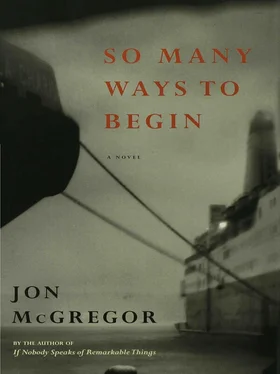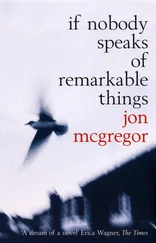Hello there Julia love, she said, it's Dorothy. We've brought Laurence to come and see you at last, and she said the at last so quietly that only Laurence could hear. Julia turned round, looking at David first, curiously, and then at Laurence, some level of understanding that wasn't quite recognition passing across her face.
Hello darling, she said, smiling abruptly. Hello, how good of you to come and see me. Have you got a kiss for poor Julia? Laurence stood in front of her for a moment, looming over her, gripping the fingers of one hand with the other, running his thumb back and forth across his palm. Julia looked up and turned her cheek towards him. He bent down to her so slowly and hesitantly that he almost lost his balance and had to grab on to the back of her chair, and as his lips touched her face he held them there, closing his eyes and seeming to hold his breath before lifting away and stepping back slightly. David looked at his mother, and past her to the window, and at Laurence. The room felt suddenly very full.
Laurence sat down on the edge of Julia's bed, his hands in his lap, looking at her. He reached up and smoothed his hair back across his head with the heel of his hand. He said, look, I'm sorry it's taken me so long to come and see you, I've been posted abroad an awful lot, you know. She ignored him, as she'd learnt to do when there was something she didn't understand, gazing steadily at the room as if he hadn't spoken at all. He tried again. So, how are they looking after you in here? Is the food good? Have you met many people? His voice was loud and slow and he leant towards her slightly as he spoke. She looked at him, and at Dorothy.
I don't think you need to shout dear, she said dryly, we can all hear you. She squashed her cigarette into the ashtray.
Laurence had signed up for officer training when he did his National Service and had been in the army ever since. He'd never married, and there were no children that anyone knew about, and from the few letters he wrote to his mother it seemed as though the army had become his entire life, talking about my boys, and the old man, as if they were his family now. David only once heard Julia say she minded these long and repeated absences, or how seldom he ever wrote to say how he was, and even then it was with an insistence that she was just being silly, that he was a grown man and what did she have to complain about? I mean, she said, he's only following in his father's footsteps, isn't he?
He was stationed in Germany when they moved her into the home. He'd had to be sent the admissions papers to sign, and the financial documents, but he'd refused to discuss the situation with them. Dorothy had written, and even spoken to him by telephone on one occasion, but he'd only ever said that he trusted her judgement. I'm out of the picture here, he'd said, you're the one on the ground. I don't think she's looking after herself properly any more, Dorothy had told him, I don't think she's able to. Right, absolutely, he said, if you think so. We're trying our best, she told him, but we can't be down there every weekend. No, of course, he said, whatever you think's best Dorothy. You're the expert, he said, leaving her to talk to Julia about what was going to happen, to arrange a place for her, to make sure that the house was cleaned occasionally. And when they'd met him outside the home that morning, running a few minutes late, he'd seemed reluctant to go inside at all, standing away from the door and tracing lines in the gravel with the toe of his shoe. Ah, hello there, he said, seeming surprised to see them. This is it then, I've got the right place? I wasn't sure what to expect, he said.
They sat quietly for a while, the four of them, drinking the tea Dorothy had sent David to fetch, looking out into the garden. Julia asked for her cigarettes, and Laurence sprang up to find them for her, holding one out of the pack and lighting it when she put it to her lips. He looked pleased with himself, relieved to be able to do something for her at last. She smoked, and they waited for her to say something. She said, I hear they're building a new school at the end of the road there, where the theatre used to be, that'll be nice. Laurence looked at Dorothy, questioningly, and she discreetly shook her head. She said, I had a letter from Kathleen. Kathleen wrote and said she was coming to stay. I hope she does. I'm sure she will. She will, wouldn't you say? she said, turning to Dorothy, lifting her head to blow a stream of smoke towards the ceiling. She said, David, how's that girlfriend of yours, what's her name, the Scottish one, how's she? He looked at her, and at his-mother, and his mother smiled and turned her face away.
She's not my girlfriend Auntie Julia, he said, embarrassed, trying to remember when he'd said anything to his mother. Not really, he said.
Oh, Julia said, smiling, my mistake, sorry, and she winked at Laurence, making him roar with sudden delighted laughter.
They left him alone with her for a couple of hours, walking out around the streets, down through the park to Julia's old house and back along the canal.
You know she's not going to get any better, his mother said, and David nodded, and they didn't say anything more about it.
14 Pair of letters, handwritten, February 1967
That's so sad what you told me about your Auntie Julia. I told my friend Ruth about it and she said her Gran went like that too, but she was much older which makes it almost not so bad. I hope it's not upsetting your mam too badly. It's funny saying that when I've never met her, but you've told me so much about her that I feel like I know her somehow. Sometimes I feel like I know her better than my own mam.
There's something strange about my mam at the moment though (more strange then normal I mean1.). I think she's upset about something, or worried, but Da won't tell me what's wrong. She's barely speaking to either of us, or going out the house, and I think I maybe heard her crying last night. She was like this sometimes when I was a wee girl, she used to blame me for it then. She said I'd tired her out completely and she needed a rest. I'm sure she'll be better soon but it's funny seeing her like it again — it seems like such a long time since it happened before. I wonder if she thinks it's my fault again, I don't see how she can when I'm hardly ever in the house. Me and Ruth stayed out until almost eleven o'clock last night1. We weren't doing anything, just sitting in town and talking and walking about, but it was great to be out like that. I almost caught it when I got home, and Da said I was lucky Mam was away in bed already and not to do it again. Ruth was looking at boys all evening but I told her I had no need.
She's like a wind-up toy that's all wound down, my mam, I mean. She moves all slow and shuffly, like she's no sure what she's doing. I hope she's not like it long this time — it gives me the creeps. I'd rather she was shouting at me, you know? I think my da is maybe taking her to the doctor's tomorrow.
Anyway I'm sorry, you didn't need to know all this. I'm just blabbering what's on my mind. How about you? What have you been doing this week? How's the museum? Have you been on any more research trips? Is Mr Newbold still giving you grief about taking time off? Write to me soon, won't you. Tell me some more things about — oh I don't know, anything. I want to know everything, David!.
Everything's a bit of a tall order, Ellie-Na. Do you want to know what I had for breakfast this morning? (Fried egg and toast.) Or how many cups of tea I made at work? (Not sure, something like twenty-eight, but I usually lose count after lunch.) Or how many files I had to look through before I found the lost index card for a thirteenth-century dish that's been on display since the museum opened? (No idea, but it felt like half the files in the whole office.) If I told you everything, Ella-Nor, I'd spend my whole life writing letters, and there'd be nothing left to tell!.
Читать дальше
Конец ознакомительного отрывка
Купить книгу











